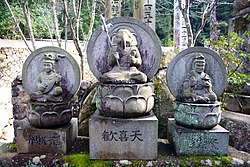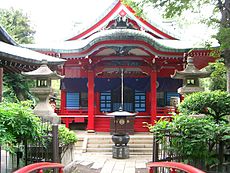| Revision as of 14:03, 17 March 2024 editExclusiveEditor (talk | contribs)Extended confirmed users6,611 edits →Cultural backgroundTag: Visual edit← Previous edit | Revision as of 14:04, 17 March 2024 edit undoExclusiveEditor (talk | contribs)Extended confirmed users6,611 edits Added {{More citations needed}} tagTag: TwinkleNext edit → | ||
| Line 1: | Line 1: | ||
| {{short description|Overview of the presence, role and impact of Hinduism in Japan}} | {{short description|Overview of the presence, role and impact of Hinduism in Japan}} | ||
| {{More citations needed|date=March 2024}} | |||
| {{Infobox religious group | {{Infobox religious group | ||
| |group=Japanese Hindus<br>日本のヒンズー教徒|image=Ganesha Japan.jpg | |group=Japanese Hindus<br>日本のヒンズー教徒|image=Ganesha Japan.jpg | ||
Revision as of 14:04, 17 March 2024
Overview of the presence, role and impact of Hinduism in Japan| This article needs additional citations for verification. Please help improve this article by adding citations to reliable sources. Unsourced material may be challenged and removed. Find sources: "Hinduism in Japan" – news · newspapers · books · scholar · JSTOR (March 2024) (Learn how and when to remove this message) |
 Statues of Benzaiten (Saraswati), Kangiten (Ganesh), and Bishamonten (Kubera) in the Daishō-in temple. Statues of Benzaiten (Saraswati), Kangiten (Ganesh), and Bishamonten (Kubera) in the Daishō-in temple. | |
| Total population | |
|---|---|
| Languages | |
| Liturgical: Sanskrit, Old Tamil |
Hinduism is a minority religion in Japan mainly followed by the Indian, Sri Lankan and Nepali expatriate residents of Japan, who number about 166,550 people as of 2022.
Cultural background

Although Hinduism is a little-practiced religion in Japan, it has still had a significant, but indirect, role in the formation of Japanese culture due to the influence and confluence of Buddhism and Hinduism. One indication of this is the Japanese "Seven Gods of Fortune", of which four originated as Hindu deities: Benzaitensama (Sarasvati), Bishamon (Vaiśravaṇa or Kubera), Daikokuten (Mahākāla or Shiva), and Kichijōten (Lakshmi). The last, along with Benzaitennyo (Saraswati) and the female version of Daikokuten completes the nipponized Tridevi of Great Goddesses.
Benzaiten arrived in Japan during the 6th through 8th centuries, mainly via the Chinese translations of the Sutra of Golden Light (金光明経), which has a section devoted to her. She is also mentioned in the Lotus Sutra. In Japan, the lokapālas take the Buddhist form of the Four Heavenly Kings (四天王). The Sutra of Golden Light became one of the most important sutras in Japan because of its fundamental message, which teaches that the Four Heavenly Kings protect the ruler who governs his country in the proper manner. The Hindu god of death, Yama, is known in his Buddhist form as Enma. Garuda, the mount (vahana) of Vishnu, is known as the Karura (迦楼羅), an enormous, fire-breathing creature in Japan. It has the body of a human and the face or beak of an eagle. Tennin originated from the apsaras. Ganesha (or Kangiten) is prayed to for health, success and good fortune. Many Japanese Buddhist deities (or Tenbu) have their roots in Hinduism and are still revered by many Japanese particularly in Shingon Buddhism. Other examples of Hindu influence on Japan include the belief of "six schools" or "six doctrines" as well as use of yoga and pagodas. Many of the facets of Hindu culture which have influenced Japan have also influenced Chinese culture. Hinduism is the fastest growing religion in Japan due large number of people coming from India and Nepal.
People have written books on the worship of Hindu gods in Japan. Even today, it is claimed Japan encourages a deeper study of Hindu Gods.
Present situation
Hinduism is practiced mainly by the Nepali, Indian and Sri Lankan migrants, although there are others. As of 2022, there are 40,917 Sri Lankans, 40,752 Indians and 125,798 Nepalis in Japan.
The few Hindu temples in Japan are as follows:
- Shirdi Saibaba Temple, Tokyo
- ISKCON New Gaya, Tokyo
- Vedanta Society of Japan, Kanagawa
- BAPS Shri Swaminarayan Mandir, Tokyo
- Shiva Shakti Temple, Tokyo
The Association of Religion Data Archives estimated that 24,182 Hindus in Japan as of 2020.
References
- "Butsuzōzui (Illustrated Compendium of Buddhist Images)" (digital photos) (in Japanese). Ehime University Library. 1796. p. (059.jpg).
- Chaudhuri, Saroj Kumar. Hindu Gods and Goddesses in Japan. (New Delhi, 2003) ISBN 81-7936-009-1.
- Mohapatra, Satyen (2023-09-03). "Japan Wants to Encourage Studies of Hindu Gods". The Pluralism Project, Harvard University.
- ^ Ministry of Justice Statistics
- "データセット一覧". e-stat (in Japanese). Retrieved 6 March 2023.
- "Japan, Religion And Social Profile". thearda.com. Retrieved 2023-06-04.
Notes
- オーム (U+30AA & U+30FC & U+30E0)

